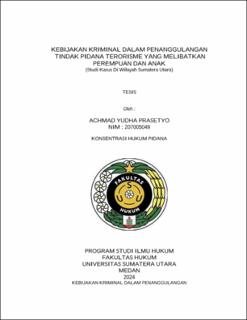| dc.description.abstract | Criminal acts of terrorism are generally committed by men, but there is an interesting fact that these acts of terrorism are not only committed by adult men but also involve women and children in them. This is a new mode or strategy carried out by the perpetrators of terrorism in order to trick the security forces, The formulation of the problem in this thesis research is the first, namely what is the policy for punishing children who are involved in criminal acts of terrorism, second, what is the policy for punishing woman who are involved in criminal acts of terrorism, and the third, how are efforts to prevent terrorism crimes involving women and children in the future? will be reviewed based on statutory regulations. The research used is normative legal research supported by empirical juridical data by conducting interviews with North Sumatra Regional Police. The nature of this research is a descriptive analysis with a statutory approach (state approach) and an analytical approach (analytical approach) using qualitative methods to draw deductive conclusions. The results of the study show that firstly, the criminal policy for terrorism crimes involving children is that children who commit acts of terrorism cannot be subject to specific minimum criminal sanctions in Articles 6, 8 to 13 and 15 of Law Number 5 of 2018 while capital punishment or life imprisonment Life also cannot be enforced but replaced with a maximum imprisonment of 10 years. Second, the criminal policy against terrorism crimes involving women has been regulated in Law Number 5 of 2018, but nothing regulates non-penal policies against women who are involved in criminal acts of terrorism. Then the third, efforts to prevent terrorism crimes involving women and children in the future are reviewed based on laws and regulations, namely by preparing National Preparedness, Counter-Radicalization, and Deradicalization Conclusions and suggestions can be seen that first, in the absence of laws governing the criminalization of children as terrorist actors, it is necessary to form a related regulation. Second, in the absence of anything that regulates women's non-penal policies against criminal acts of terrorism, it is necessary to establish a special regulation regarding this matter. Third, by preparing National Preparedness, Counter-Radicalization, and Deradicalization, synergy is needed between law enforcement officials, the government, the community, the private sector and other parties. | en_US |


